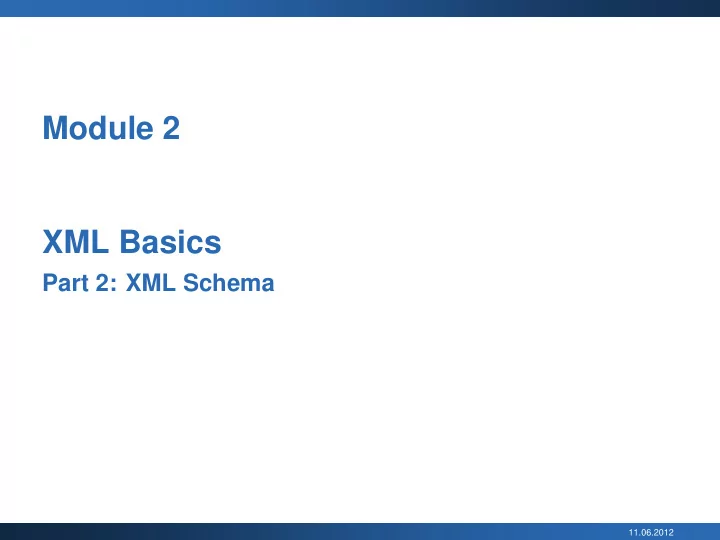

Module 2 XML Basics Part 2: XML Schema 11.06.2012
Limitations of DTDs DTDs describe only the "grammar" of the XML file, not the detailed structure and/or types This grammatical description has some obvious shortcomings: we cannot express that a "length" element must contain a non- negative number (constraints on the type of the value of an element or attribute) The "unit" element should only be allowed when " amount" is present (co-occurrence constraints) the " comment" element should be allowed to appear anywhere (schema flexibility) There is no subtyping / inheritance (reuse of definitions) There are no composite keys (referential integrity) 11.06.2012 Peter Fischer/Web Science/peter.fischer@informatik.uni-freiburg.de
Overview XML Schema Schemas provide a complex type system, similar to strongly-typed object-oriented approaches or the UDT system of SQL 2003 (object-relational types) ComplexTypes and SimpleTypes ComplexType correspond to Records/Objects "string" is an example of a SimpleType Built-in and user-defined Types ComplexTypes are always user-defined Built-in types cover "usual" types + XML-specific ones Elements have complexTypes or simpleTypes; Attributes have simpleTypes 11.06.2012 Peter Fischer/Web Science/peter.fischer@informatik.uni-freiburg.de
Overview XML Schema (II) Visibility/Scope of type and element definitions Global Types vs local Types Global element definition vs local element definitions Named vs anonymous types Fine-grained control of type properties: "facets" Type of Root element of a document is global (almost) downward compatible with DTDs Schemas are XML Documents (Syntax) Namespaces etc. are part of XML Schemas 11.06.2012 Peter Fischer/Web Science/peter.fischer@informatik.uni-freiburg.de
"Path to Schema" - Agenda Schema by Example (syntax, common cases) Validation Overview on builtin types/simple types Defining complex content Key constraints Namespaces Additional Aspects (not relevant for exam) 11.06.2012 Peter Fischer/Web Science/peter.fischer@informatik.uni-freiburg.de
Example Schema <?xml version="1.0" ?> <xsd:schema xmlns:xsd="http://www.w3.org/2001/XMLSchema"> <xsd:element name="book" type="BookType"/> <xsd:complexType name="BookType"> <xsd:sequence> <xsd:element name="title" type="xsd:string"/> <xsd:element name="author" minOccurs="1" maxOccurs="unbounded"/> <xsd:complexType> <xsd:sequence> ... <xsd:sequence> </xsd:complexType> </xsd:element> <xsd:element name="publisher" type="xsd:anyType"/> </xsd:sequence> </xsd:complexType> </xsd:schema> 11.06.2012 Peter Fischer/Web Science/peter.fischer@informatik.uni-freiburg.de
Example Schema <?xml version="1.0" ?> <xsd:schema xmlns:xsd="http://www.w3.org/2001/XMLSchema"> ... </xsd:schema> Schema in a separate XML Document Vocabulary of Schema defined in special Namespace. Prefixes "xs"/"xsd" commonly used There is a Schema for Schemas (don‘t worry!) „schema" Element is always the Root 11.06.2012 Peter Fischer/Web Science/peter.fischer@informatik.uni-freiburg.de
Example Schema <xsd:element name="book" type="BookType"/> "element" Element in order to declare elements "name" defines the name of the element. "type" defines the type of the element Declarations under "schema" are global Global element declarations are potential roots Example: "book" is the only global element, root element of a valid document must be a "book". The type of a "book" is BookType (defined next). 11.06.2012 Peter Fischer/Web Science/peter.fischer@informatik.uni-freiburg.de
Example Schema <xsd:complexType name="BookType"> <xsd:sequence> ... </xsd:sequence> </xsd:complexType> User-defined complex type Defines a sequence of sub-elements Attribute "name" specifies name of Type This type definition is global. Type can be used in any other definition. 11.06.2012 Peter Fischer/Web Science/peter.fischer@informatik.uni-freiburg.de
Example Schema <xsd:sequence> <xsd:element name="title" type="xsd:string"/> </xsd:sequence> Local element declaration within a complex type („title" cannot be root element of documents) „name" and „type" as before „xsd:string" is built-in type of XML Schema 11.06.2012 Peter Fischer/Web Science/peter.fischer@informatik.uni-freiburg.de
Example Schema <xsd:element name="author" minOccurs="1" maxOccurs="unbounded"/> Local element declaration "minOccurs", "maxOccurs" specify cardinality of "author" Elements in "BookType". Default: minOccurs=1, maxOccurs=1 11.06.2012 Peter Fischer/Web Science/peter.fischer@informatik.uni-freiburg.de
Example Schema <xsd:complexType> <xsd:sequence> <xsd:element name="first" type="xsd:string"/> <xsd:element name="last" type="xsd:string"/> <xsd:sequence> </xsd:complexType> Local, anonymous type definition May only be used inside the scope of the definition of BookType. The same syntax as for BookType. 11.06.2012 Peter Fischer/Web Science/peter.fischer@informatik.uni-freiburg.de
Example Schema <xsd:element name="publisher" type=" xsd:anyType "/> Local element declaratation Every book has exactly one "publisher" minOccurs, maxOccurs by default 1 "anyType" is built-in Type "anyType" allows any content "anyType" is default type. Equivalent definition: <xsd:element name="publisher" /> 11.06.2012 Peter Fischer/Web Science/peter.fischer@informatik.uni-freiburg.de
Example Schema <?xml version="1.0" ?> <xsd:schema xmlns:xsd="http://w3.org/2001/XMLSchema"> <xsd:element name="book" type="BookType"/> <xsd:complexType name="BookType"> <xsd:sequence> <xsd:element name="title" type="xsd:string"/> <xsd:element name="author"> minOccurs="1" maxOccurs="unbounded"/> <xsd:complexType> <xsd:sequence> ... <xsd:sequence> </xsd:complexType> </xsd:element> <xsd:element name="publisher" type="xsd:anyType"/> </xsd:sequence> </xsd:complexType> </xsd:schema> 11.06.2012 Peter Fischer/Web Science/peter.fischer@informatik.uni-freiburg.de
Valid Document? <?xml version="1.0"> <book> <title>Die Wilde Wutz</title> <author><first>D.</first> <last>K.</last></author> <publisher> Addison Wesley, <state>CA</state>, USA </publisher> </book> 11.06.2012 Peter Fischer/Web Science/peter.fischer@informatik.uni-freiburg.de
Validate Document <?xml version="1.0"> Root is book <book> <title>Die Wilde Wutz</title> <author><first>D.</first> <last>K.</last></author> <publisher> Addison Wesley, <state>CA</state>, USA </publisher> </book> 11.06.2012 Peter Fischer/Web Science/peter.fischer@informatik.uni-freiburg.de
Validate Document <?xml version="1.0"> Exactly one title <book> of Type string <title>Die Wilde Wutz</title> <author><first>D.</first> <last>K.</last></author> <publisher> Addison Wesley, <state>CA</state>, USA </publisher> </book> 11.06.2012 Peter Fischer/Web Science/peter.fischer@informatik.uni-freiburg.de
Validate Document <?xml version="1.0"> Subelements <book> in right order <title>Die Wilde Wutz</title> <author><first>D.</first> At least one <last>K.</last></author> author <publisher> Addison Wesley, of Type <state>CA</state>, USA PersonType </publisher> </book> One publisher with arbitrary content. 11.06.2012 Peter Fischer/Web Science/peter.fischer@informatik.uni-freiburg.de
Schema Validation Conformance Test Result: "true" or "false" Varying degree of strictness: strict, lax, skip Infoset Contribution (see Module 3) Annotate Types Set Default Values Result: new instance of the data model Tools: Xerces (Apache) Theory: Graph Simulation Algorithms Validation is a-posteri; explicit - not implicit! 11.06.2012 Peter Fischer/Web Science/peter.fischer@informatik.uni-freiburg.de
"Path to Schema" - Agenda Schema by Example (syntax, common cases) Validation Overview on builtin types/simple types Defining complex content Key constraints Namespaces Additional Aspects (not relevant for exam) 11.06.2012 Peter Fischer/Web Science/peter.fischer@informatik.uni-freiburg.de
Recommend
More recommend